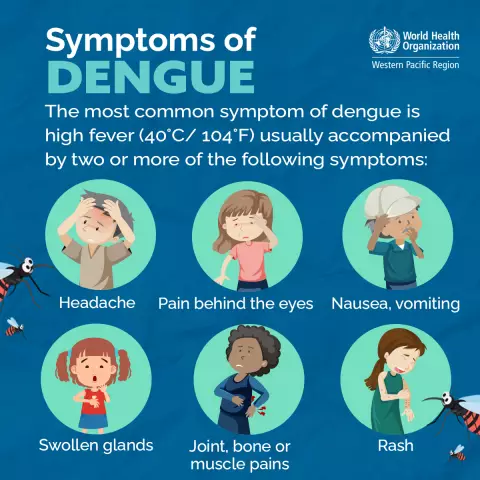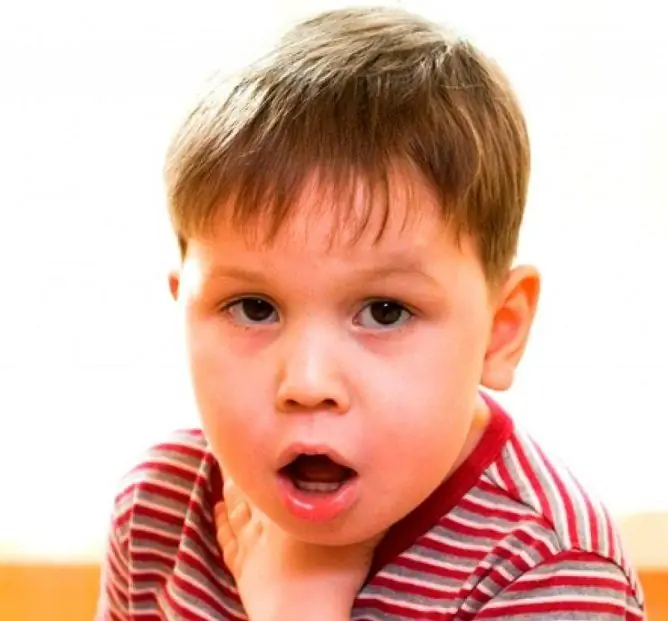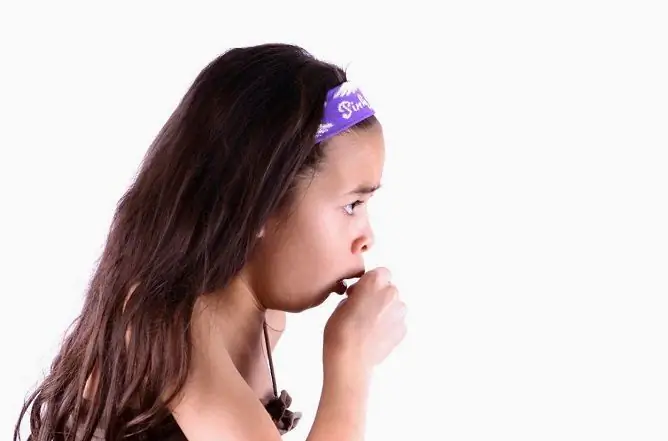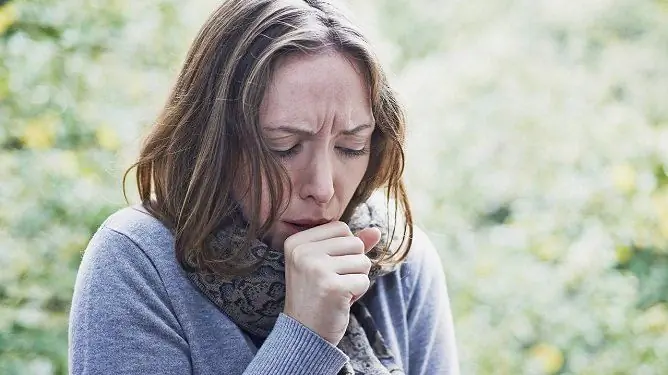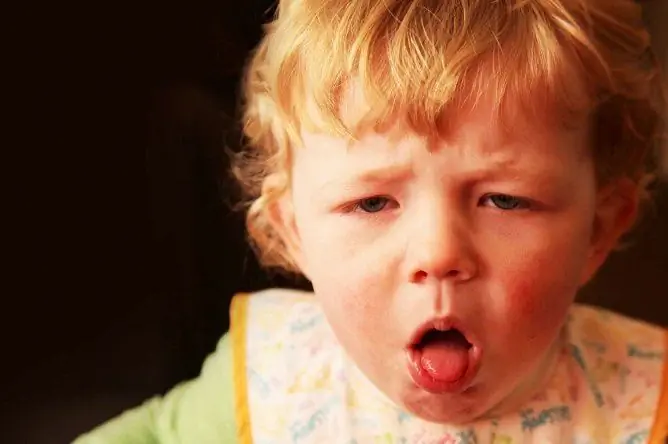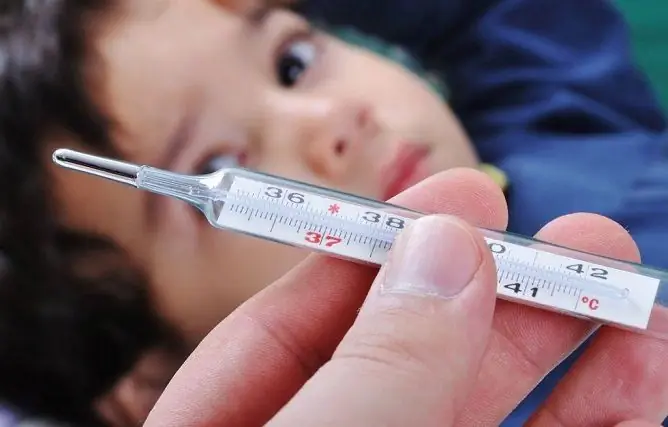- Author Rachel Wainwright wainwright@abchealthonline.com.
- Public 2023-12-15 07:39.
- Last modified 2025-11-02 20:14.
Cough in a child without fever: causes and treatment
The content of the article:
- When not to worry
- Who to contact
-
Types of cough
- Acute cough
- Chronic cough
- Allergic cough
- Treatment for cough without fever
The most common causes of a cough in a child are respiratory diseases, most often caused by a viral infection. In addition to coughing, they are accompanied by fever, nasal discharge, and other typical symptoms. However, when the most important symptom associated with a respiratory illness - fever is absent, and the cough continues, this leads to confusion and anxiety for parents.
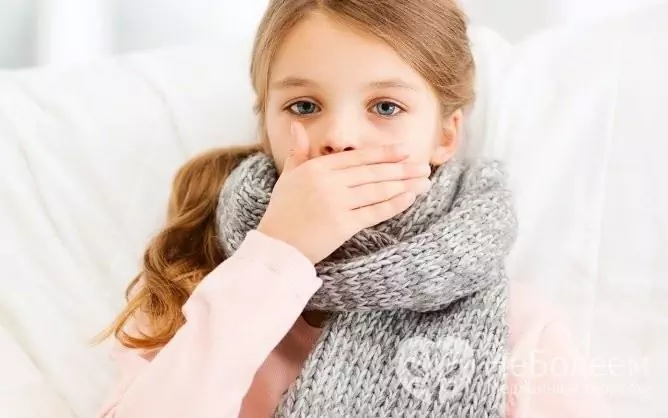
When not to worry
Often, a child's cough is a reaction of the child's body to an unhealthy environment, which adults may not even notice - the presence of irritating impurities, dust, low humidity in the air. Such a cough is not regular if negative factors are excluded. Analyze the child's behavior - a child's cough at night should cause anxiety, but an active, vigorous child does not need treatment. It is necessary to understand the cause and eliminate it, for example, carry out high-quality wet cleaning.
A cough in a child without a fever may be a manifestation of suppressed stress
The psychogenic nature of coughing is an increasingly frequent occurrence in our time. Think about what life situations might have caused it, considering that children perceive events in a completely different way than adults.
It is still more difficult with infants - they have not fully developed a cough reflex, which makes it impossible to fully cough up sputum. Percussion massage should be performed by the mother to help the infant cope with the problem of coughing.
Who to contact
Going to a doctor with a cough in a child without fever is quite natural and even mandatory, since parents cannot always objectively assess the condition of the baby. The pediatrician who “leads” the baby from the moment of his birth knows the anamnesis and all the features of his organism. This is the main person responsible for the health of his ward.
The pediatrician solves the difficult tasks that the growing organism poses to the parents. The pediatrician will professionally assess the condition of the little patient and, if necessary, refer him to specialized specialists - otolaryngologist, allergist, phthisiatrician, pulmonologist. Immediately, you should consult a doctor in such cases:
- there are pains in the chest area;
- coughing fits are accompanied by vomiting;
- difficulty breathing is noted;
- persistent coughing prevents the child from falling asleep.
When the usual symptoms in the form of fever and runny nose are absent, and the child's cough continues, this is more than a sufficient reason to consult a doctor.
A prolonged cough in a child without a fever is a serious cause for concern
Types of cough
The characteristics of a cough in a child without fever are determined by duration, character and tone. Acute cough is the main symptom of respiratory illness and does not last for 3 weeks. A more prolonged cough is characterized as chronic, and may indicate the presence of an allergy or the transition of the disease to a chronic stage.
During the period of acute cough in a child, treatment is most successful if the disease was diagnosed in a timely manner. The transition of a cough from an acute to a chronic form speaks of shortcomings in the observation of a small patient, and poses more difficult tasks for parents and doctors.
The nature of the child's cough directly indicates the stage of the disease:
- dry - without sputum production, sometimes harsh, debilitating, manifests itself in the peak periods of the development of an infectious disease, such as ARVI, such a cough is called unproductive;
- wet - with expectoration of mucus (sputum) is called productive, most often it indicates the addition of a bacterial infection.
A dry cough in a child without fever should be translated into a productive cough - with expectoration of sputum. With such a cough, the child should be tested for bronchial asthma or allergies.
An older child needs to be explained that with a wet cough, sputum must be spit out, since it is an infection that is removed from his body. To liquefy too thick sputum, mucolytic agents are taken as prescribed by a doctor.
A barking cough in a child indicates swelling of the mucous membrane of the pharynx, throat and vocal cords. The narrowing of the larynx space is the cause of a cough that is similar to a dog's barking. Among the reasons that provoke a barking cough in a child without fever, there may be an allergic reaction, as well as a number of diseases such as laryngitis, false croup, diphtheria, whooping cough.
A cough in a child without a fever can also be of a psychogenic nature, it manifests itself in the form of frequent loud single cough shocks. A psychogenic cough in a child does not manifest itself during sleep, but the intensity increases during wakefulness. Its duration can vary from a week to several months.
Stodal syrup is widely used for the treatment of cough in children. Taking the drug from the first days of the onset of cough against the background of ARVI can shorten the treatment period from 3 to 1 week [1]. Possessing anti-inflammatory, antimicrobial and antitussive action, Stodal has no age restrictions and is suitable even for babies [2], [3].
Acute cough
An acute cough in a child lasts no more than three weeks and, as a rule, is a consequence of the presence of an acute respiratory viral infection (ARVI). ARVI is the most common disease accompanied by a dry cough in a child. At this stage, the accompanying symptoms of a dry cough in a child are almost always fever and a runny nose. However, a child's cough may continue for some time after recovery in the absence of other symptoms. Such a cough is called residual or, in another way, it is called "cough plume".
A child's cough should be a reason for parents to urgently see a doctor if:
- the state of health is seriously deteriorating;
- no improvement occurs within 10 days;
- the temperature stays above 38 ◦ for several days;
- the baby's breathing becomes difficult.
Chronic cough
A child's chronic cough lasts at least 4 weeks. With such symptoms, you should contact your pediatrician.
In addition, there is such a thing as a chronic nonspecific cough, the cause of which cannot be determined by traditional methods. Often, these are the consequences of the transferred respiratory viral diseases, which caused hypersensitivity of the cough receptors.
Fresh, clean air is the most important factor in all stages of cough treatment
Allergic cough
With such a cough, the child does not have a fever, but there are obvious reasons for the aggravation of seizures:
- there is contact with plant pollen or contact with animals;
- there is a reaction to certain foods;
- there is a night and morning increase in coughing attacks.
Bronchial asthma is also characterized by a cough in a child without fever. It is quite difficult to diagnose this disease in the early stages, however, parents should pay attention if a child's coughing attacks begin after active games, in the cold or in the process of emotional stress.
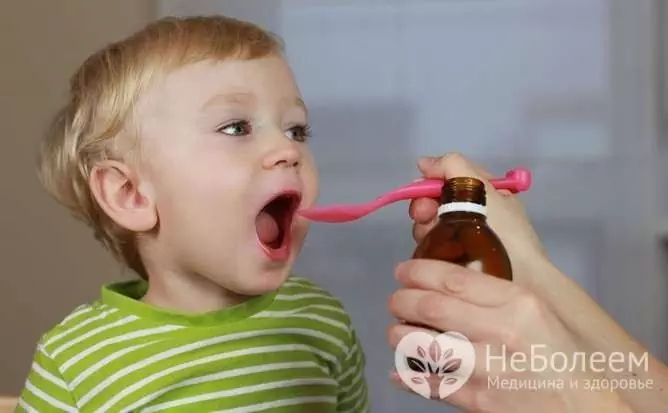
Treatment for cough without fever
If an accurate diagnosis is not established, the treatment of a cough without fever in a child is complex, and begins with the correct organization of life and daily routine. It is necessary to exclude any negative influences of the external environment, to provide a sufficient amount of fresh air in the room with the required (at least 70%) humidity. Potential allergens must be excluded - be it food, plants or pets.
In the case of a diagnosis and understanding of the cause of a cough in a child without fever, an appropriate course of treatment is prescribed. Medical treatment of a child's cough without a fever is a key aspect in the treatment of cough. The following medications are generally recommended:
- antitussives;
- antimicrobial;
- mucolytics;
- expectorant.
Mucolytics counteract the development of bacterial infection by preventing phlegm from stagnating in the trachea and bronchi
At the initial stage, it is advisable to include Stodal children's syrup in the ARVI treatment program - this will significantly reduce the treatment time, namely from 3 to 1 week [1]. Its multi-component natural composition is effective for various types of cough, is indicated for children of all ages and is compatible with any medications.
In some cases, your doctor will prescribe physical therapy to help relieve symptoms. In the absence of contraindications, UHF, electrophoresis, inhalation procedures can be very effective.
[1] Zakharova IN, Zaplatnikov AL, Sugyan NG, Lazareva SI, Svyatkina Ye. I. The effectiveness of the drug Stodal for coughing in children against the background of ARI. Pediatrics. Consilium Medicum 2019 # 1, 37-43 / Pediatrics. Consilium Medicum 2019 No. 1.37-43.
[2] According to the instructions for medical use of the drug Stodal
[3] A. Zanasi a, M. Mazzolini a, F. Tursi b, AM Morselli-Labate c, A. Paccapelo c, M. Lecchi. Homeopathic medicine for acute cough in upper respiratory tract infections and acute bronchitis: A randomized, double-blind, placebo-controlled trial. Pulmonary Pharmacology & Therapeutics, 27 (2014) 102-108.
Found a mistake in the text? Select it and press Ctrl + Enter.

